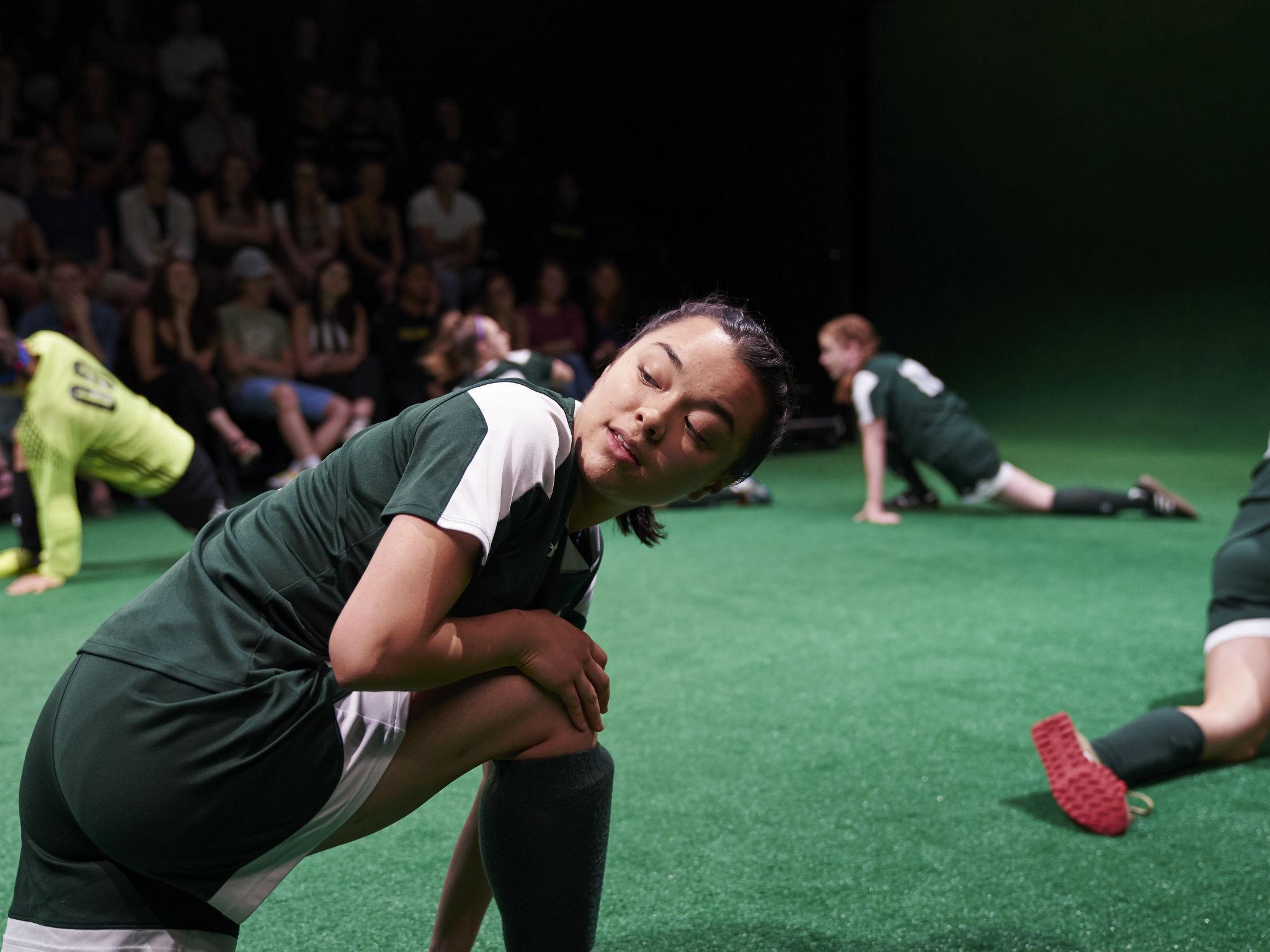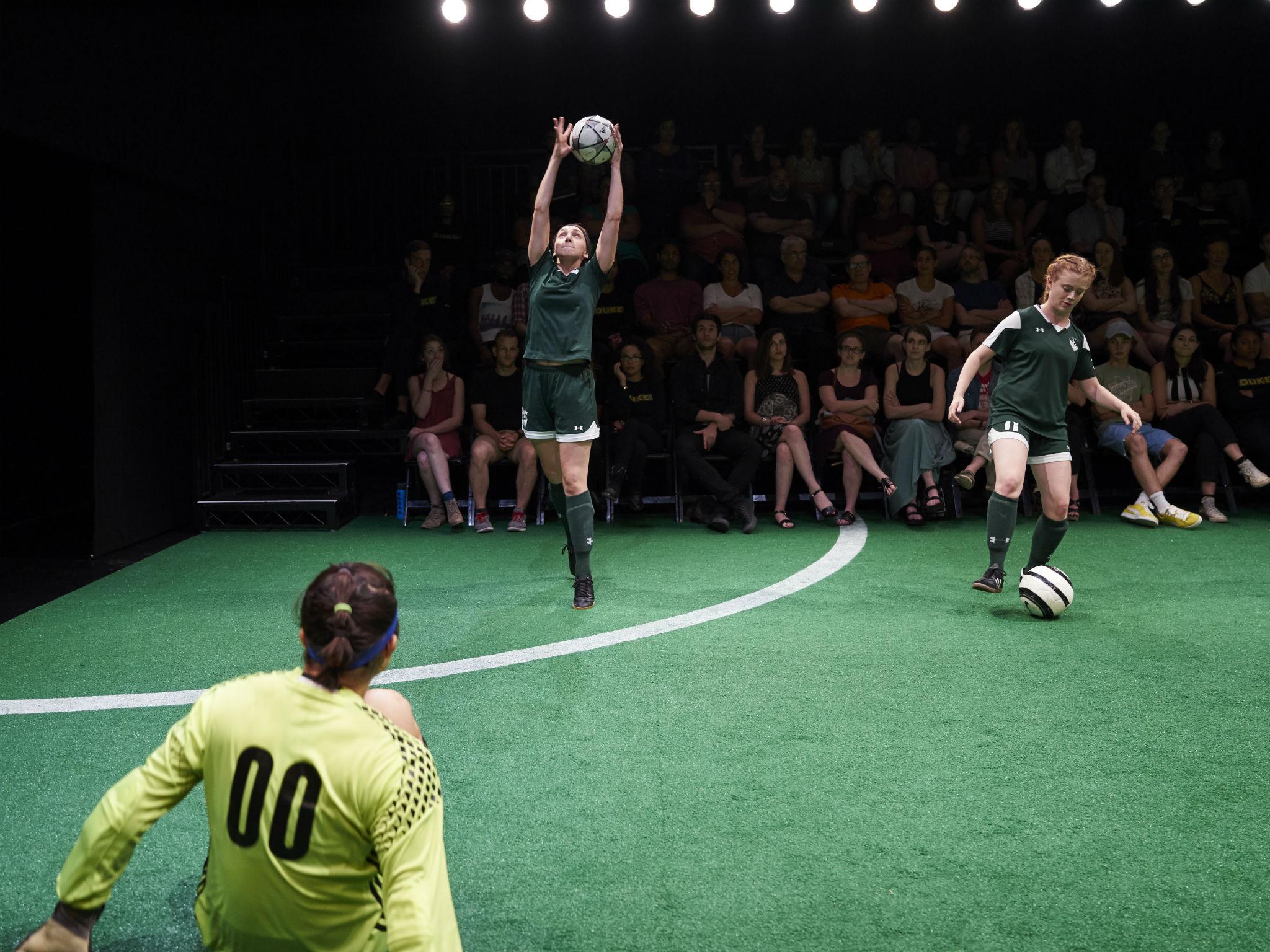The Wolves review: Nine teenage football 'warriors' are testing theatre limits in Sarah DeLappe's debut, all-female play
In this beautiful mix of 'war movie' and dance theatre, nine teenage girls are battling it out on the soccer pitch

Your support helps us to tell the story
From reproductive rights to climate change to Big Tech, The Independent is on the ground when the story is developing. Whether it's investigating the financials of Elon Musk's pro-Trump PAC or producing our latest documentary, 'The A Word', which shines a light on the American women fighting for reproductive rights, we know how important it is to parse out the facts from the messaging.
At such a critical moment in US history, we need reporters on the ground. Your donation allows us to keep sending journalists to speak to both sides of the story.
The Independent is trusted by Americans across the entire political spectrum. And unlike many other quality news outlets, we choose not to lock Americans out of our reporting and analysis with paywalls. We believe quality journalism should be available to everyone, paid for by those who can afford it.
Your support makes all the difference.At first glance, it might seem like any group of teenage girls. While some are joking about tampons, others are arguing over the Khmer Rouge.
So starts Sarah DeLappe’s award-winning debut play The Wolves, which she wrote in three weeks after being inspired at a New Museum exhibition of Middle Eastern art. What began as a conversation, typed up on her phone on the subway home, ended up as a 90-minute, award-winning play about the evolution of a nine-strong, high school football team as they warm up between games.
"It was like a stream of consciousness, but I knew when the voices broke and which voice belonged to which person," the Yale graduate and Brooklyn College MFA student said, alluding to the overlapping dialogue. Editing her first draft was like composing an orchestral piece, she added, perfecting the violins here and the piano there.
There are no parents - until the end - no coaches, and no men.
Talking over each other at first, their language peppered with laughter and expletives, the girls test ideas and form their own identities. While one girl worries about going on a holiday with her friend’s boyfriend and his friend - an incident which will tear them apart - another girl is battling to hide her eating disorder, which the audience witnesses when she binges on orange slices on a quiet corner of the football field.
Directed by Lila Neugebauer, another Yale graduate, the actors trained intensely in upstate New York in the sweltering heat to perfect their dribbling, passing and goalie skills, without letting their talent on the pitch speak louder than their own stories.
The play is inherently physical, but not sexual. The actors are constantly moving; dribbling the ball and carrying out complicated drills, to the point where the audience may well wonder how they can remember their lines at the same time. The goalie, played by Lizzy Jutila, performs a solo, intense warm-up, racing up and down until she is crying, an attempt to express frustration about her crippling shyness and fear before a match.

DeLappe described them as “warriors”.
"At a certain point I thought I was writing a war movie. Instead of a bunch of 19-year-old men going to battle, it was a group of 16-year-old girls going to a soccer game. And that’s a different type of war."
DeLappe said she was fighting against stereotypes, which she was reluctant to name, of teenagers - airheads glued to their phones, inherently sexual and dangerous party girls. Instead, she wanted to create a distinct group of characters, whose voices and personalities could shine above the astroturf, and yet also allow the audience to recognise each character in their own lives.
She said the way the girls talked, which the 26-year-old picked up on from tutoring teenagers, was "beautiful" - including all the “like”s, hyperbole and inflections.
"There’s a lot of football jargon in there. It was like they had their own language and I was drawn to that," she said.
Instagram, Snapchat and Twitter are a central feature in any teenager's life. The playwright herself is not on social media - she said it served as a distraction from her work and she would rather focus on her real relationships. But after Donald Trump was elected, she said she might go back to it, to no longer be politically complacent and be part of the conversation. Does politics factor into her work?
"I guess it does," she said.
It’s clear DeLappe is not willing to sing her own praises. Asides from DeLappe's awards and acclaim, the best testament of the play’s powerful storytelling and universal appeal was the mixed audience, complete with older men alternately snorting laughter and wiping away tears.
But it was all about the girls, and - perhaps most telling - a group of them were giggling in the front row.
The Wolves is in previews at the Duke Theatre in Manhattan and opens 5-24 December.
Join our commenting forum
Join thought-provoking conversations, follow other Independent readers and see their replies
Comments